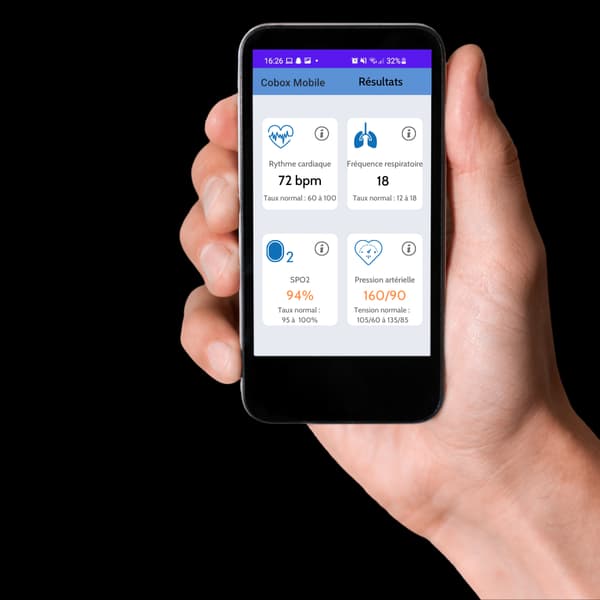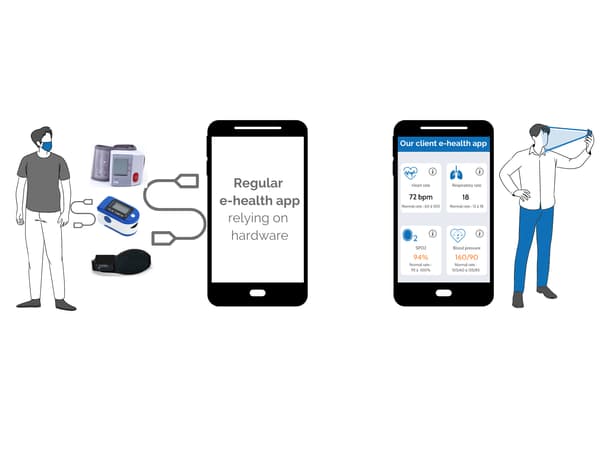Quantic, a French startup, has developed a technology that allows the camera of a smartphone filming a face to measure blood pressure, respiratory rate … A possible revolution for home medicine or even medical deserts.
Health and smartphones are increasingly closely linked. Apple, for example, makes it a workhorse and highlights in its advertisements the possibility of measuring your heart rate from your connected watch.
If for some, this is still an unreliable gadget, developments in this field are accelerating. In France, Quantic, a young French start-up, has developed a technology called Cobox which makes it possible to measure constants via any smartphone photo sensor.
Technically, Quantic leverages technology rPPG or “photo plethysmography” from a distance, the principle of which is to measure the rate of absorption of light by the blood circulating under the face, which makes it possible to deduce physiological constants such as blood pressure, pulse, frequency respiratory, oxygen saturation of the blood or arrhythmia and of course the temperature.
Crucial reliability
The result is given in less than 20 seconds after a patient’s pause time of 10 to 30 seconds, regardless of the color of his skin (which implies differences in light absorption). One shot is enough.

The data collected from the smartphone is transmitted (in a proprietary and therefore secure format) to Qantic’s servers which process them with a dose of artificial intelligence and return the results to the terminal.
Its founder and CEO, Alain Habra notably joined forces with Fabien Niel, a renowned doctor in quantum physics to develop this solution “in less than two years”, he explains to BFM Business.
It is not a question of proposing an application solution for the general public but rather a tool for doctors. Reliability is therefore crucial. “We are in the certification phase with the authorities, we should obtain it in 2022, but the technology has been validated, it was developed under the supervision of a recognized scientific committee“continues the founder.
Shortage of medical equipment
There are many use cases. “Our core target are digital health players and in particular specialists in teleconsultation and home medicine. There are 2 billion people in the world who suffer from a chronic disease and we can follow them. with this type of solution “, explains Alain Habra.
The manager recalls that connected “hardware” solutions (various and varied equipment) exist for remote medicine but they involve a significant cost in equipment and require good handling on the part of the patient. Which results in the possibility of bias. In addition, their availability can pose a problem, especially at present with the shortage of components.

“Like the lack of ventilators at the start of the Covid pandemic, medical equipment is a rare commodity, expensive and not often available when and where it is needed,” said the start-up.
Conversely, the use of the smartphone is controlled, in particular the fact of taking pictures (selfies). And Quantic has planned various scenarios to avoid mistakes.
Telemedicine, emergency management, medical deserts …
“When we take a measurement, we give information on the screen on the quality of the measurement if it was taken incorrectly. We can take care of the patient remotely. And of course, we have developed compensation and compensation algorithms. error correction “, continues the manager. In addition, the solution for the patient (and Social Security) is much less expensive than the rental of dedicated equipment at home.
Alain Habra is targeting other application cases such as “sorting in the emergency room because it is a real problem. We can reduce the waiting time which can reach 4 hours for 20% of patients and many do not need to ‘Be there. We are also targeting nurses and home nurses, the Ephad because it is complicated to take the constants of elderly people with reduced mobility “.
The idea is also to offer this kind of solutions in countries that are under-medical and where there is a glaring lack of medical equipment, especially in Africa. However, the penetration of the smartphone in the continent is very important. “The device can be entrusted to ambulant nurses who would come into contact with the patient”, explains the CEO.
While waiting for Africa and its certifications, Quantic is working with AP-HP and various university hospitals “with very satisfactory results” while carrying out international experiments to adapt the solution to all skin types. Several large contracts are in the pipeline according to our information.

